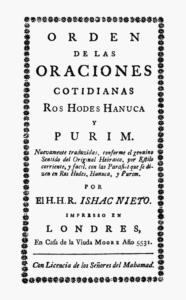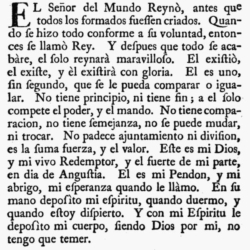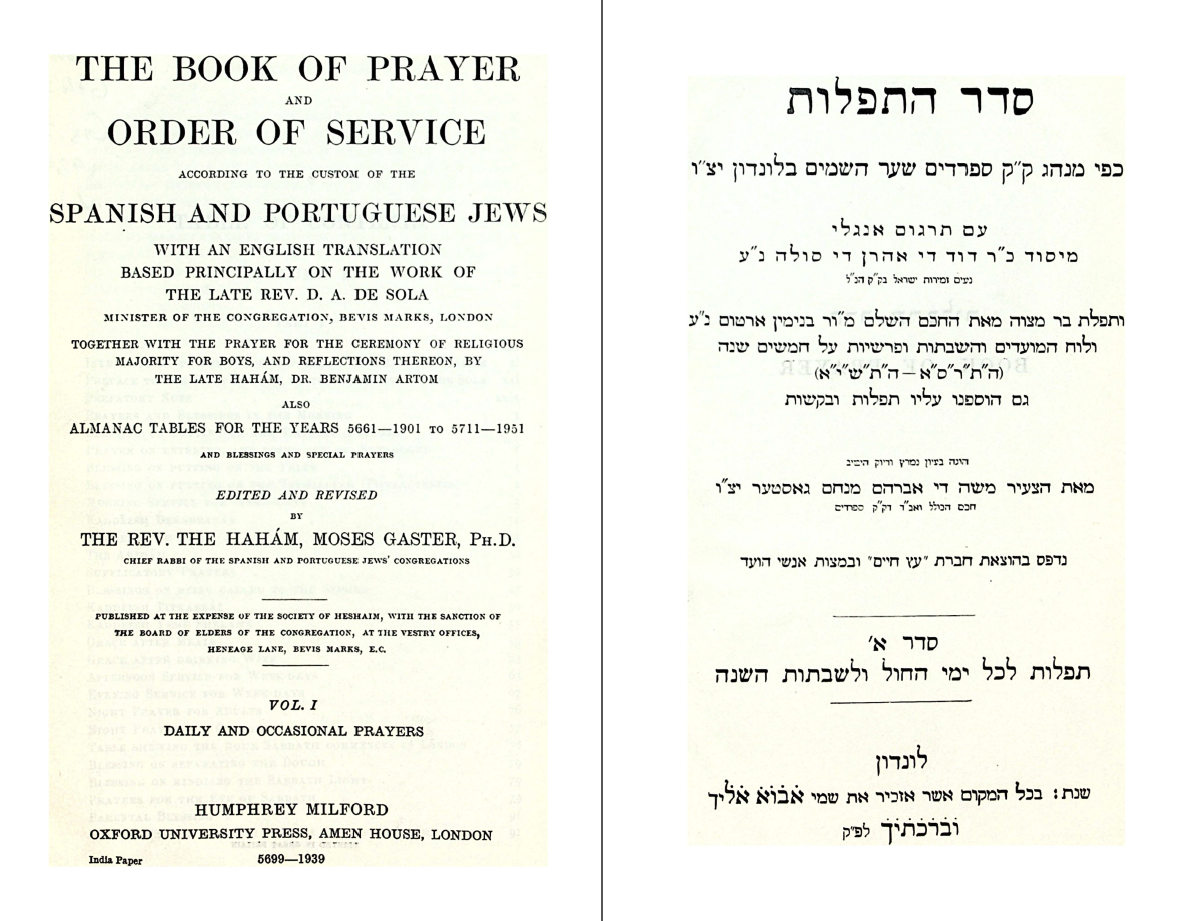Part two of Ḥakham Ishak Nieto’s two volume set of prayerbooks: Orden de las Oraciones Cotidianas Ros Hodes Hanuca y Purim (London, 1771), the basis of all subsequent S&P translations (e.g., those of Aaron and David de Sola).

This work is in the Public Domain due to its having been published more than 95 years ago.

“📖 (מנהג הספרדים) Orden de las Oraciones Cotidianas Ros Hodes Hanuca y Purim (Spanish translation by Ḥakham Ishak Nieto, 1771)” is shared through the Open Siddur Project with a Creative Commons Public Domain Dedication 1.0 Universal license.
Isaac Nieto (1702–1774) (יצחק ניטו) was Ḥakham of the Portuguese congregation Sha'are Hashamayim, Bevis Marks, London, and the son of David Nieto. In 1749 Nieto became Gibraltar's first Rabbi when he travelled to Gibraltar from London and established the Shaar Hashamayim congregation. His prayer-book in two volumes: Orden de las Oraciones de Ros Ashanah y Kipur (London, 1740) and Orden de las Oraciones Cotidianas, Ros Hodes Hanuca y Purim (London 1771) was the basis of all subsequent translations (e.g., those of Isaac Pinto and of Aaron and David de Sola).
Aharon Varady, founding director of the Open Siddur Project, is a copyright researcher and amateur book scanner. He prepares digital images and new digital editions of prayer books and related works in the Public Domain in order to make their constituent parts (prayers, translations, annotations, etc.) publicly accessible for collaborative transcription by project volunteers. (In some cases, he finds existing digital editions prepared by others that require correction and reformatting.) If you appreciate his efforts, please send him a kind note or contribute to his patreon account.
Stable Link:
https://opensiddur.org/?p=33163
Associated Image:
(This image is set to automatically show as the "featured image" in shared links on social media.)
Re-formatted:
ODT
Terms of Use:
Be a mentsch (a conscientious, considerate person) and adhere to the following guidelines:
- Properly attribute the work to Ishac Nieto and Aharon N. Varady (digital imaging and document preparation).
- Clearly indicate the date you accessed the work and in what ways, if any, you modified it. (If you have adapted the work, let us know so that the contributor might consider endorsing your revision.)
- Provide the stable link to this resource: <https://opensiddur.org/?p=33163>.
- Indicate that the original work was shared under the Creative Commons Zero (CC 0) Universal license a Public Domain dedication. (To redistribute or remix this work in any format, modified or unmodified, you must refer to the terms of the license under which the work is shared.)
Additional Notes:
- The views expressed in this work represent the views of their creator(s) and do not necessarily represent the views of the Open Siddur Project's developers, its diverse community of volunteer contributors, or its institutional partners.
- We strongly advise against printing sacred texts and art containing divine names as these copies must be regarded with reverence, complicating their casual treatment and disposal.
- If you must dispose of a printed sacred text (one containing Divine Names), please locate the closest genizah (often established by a synagogue) and contact its custodians for further instructions. We also recommend using Morah Yehudis Fishman's Prayer for Adding a Work to the Genizah.
Support this work:
The Open Siddur Project is a volunteer-driven, non-profit, non-commercial, non-denominational, non-prescriptive, gratis & libre Open Access archive of contemplative praxes, liturgical readings, and Jewish prayer literature (historic and contemporary, familiar and obscure) composed in every era, region, and language Jews have ever prayed. Our goal is to provide a platform for sharing open-source resources, tools, and content for individuals and communities crafting their own prayerbook (siddur). Through this we hope to empower personal autonomy, preserve customs, and foster creativity in religious culture.
ויהי נעם אדני אלהינו עלינו ומעשה ידינו כוננה עלינו ומעשה ידינו כוננהו "May the pleasantness of אדֹני our elo’ah be upon us; may our handiwork be established for us — our handiwork, may it be established." –Psalms 90:17







![📖 (מנהג הספרדים) Prayers for Shabbath, Rosh-Hashanah, and [Yom] Kippur (translated by Isaac Pinto, 1766)](https://opensiddur.org/wp-content/uploads/2020/08/prayers-of-shabbat-rosh-hashanah-and-kippur-Isaac-Pinto-1766-title-page.png)


Leave a Reply